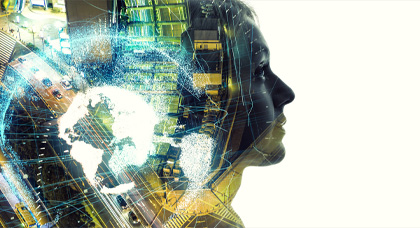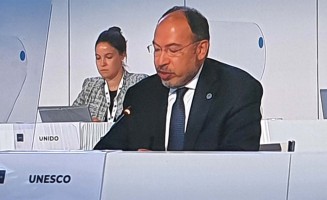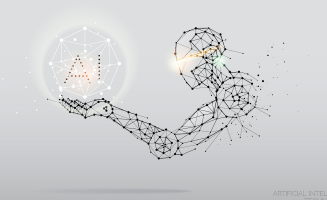Today, artificial intelligence plays a role in billions of people’s lives. Sometimes unnoticed but often with profound consequences, it transforms our societies and challenges what it means to be human.
AI can provide millions of students with support to complete secondary education, fill an additional 3.3 million jobs, and, more urgently, help us tackle the spread and the aftermath of the COVID-19 pandemic. Along with multiple advantages, these technologies also generate downside risks and challenges, derived from malicious use of technology or deepening inequalities and divides.
We need international and national policies and regulatory frameworks to ensure that these emerging technologies benefit humanity as a whole.
We need a human-centred AI. AI must be for the greater interest of the people, not the other way around.
 UNESCO member states adopt the first ever global agreement on the Ethics of AI
UNESCO member states adopt the first ever global agreement on the Ethics of AI
It will not only protect but also promote human rights and human dignity, and will be an ethical guiding compass and a global normative bedrock allowing to build strong respect for the rule of law in the digital world. More information
5 things you need to know about AI
AI has proven its value in confronting the COVID-19 pandemic
It contributes to slowing down the economic impact of the crisis through digital platforms. It also helps researchers crunch huge amounts of data in the race to find a vaccine or treatment. AI has participated to contain the spread of the virus through test, track and trace technologies. Yet, as people are giving access to their data, the use of AI during this pandemic has reopened concerns regarding privacy, data protection and the use of data beyond the needs of virus-tracking.
AI-driven growth is likely to be highly unequal
AI is expected to generate nearly US$ 4 trillion in added value by 2022. By 2030, economic gains are expected to be strongest in China and North America, representing 70 % of AI’s global economic impact. AI has a “winner takes it all” dynamic that needs to be regulated: concentration of AI in the hands of few high-income countries will likely leave developing countries far behind. The latter will not benefit or very little from AI technologies and will lack ownership of such technologies.
AI contributes to widening existing gender gaps
Only 22 % of all AI professionals are women. Because they are underrepresented in the industry, gender biases and stereotyping are being reproduced in AI technologies. It is not a coincidence that virtual personal assistants such as Siri, Alexa or Cortana are “female” by default. The servility and sometimes submissiveness they express are an example of how AI can (continue to) reinforce and spread gender bias in our societies.
AI can be a powerful tool to address climate change and environmental issues
As the planet continues to warm, climate change impacts are worsening. By gathering and analysing data, AI-powered models could, for example, help to improve ecosystem management and habitat restoration, essential to diminish the decline of fish and wildlife populations. That said, data extraction consumes nearly 10 % of energy globally. So, it is also essential to address the high energy consumption of AI and the consequential impact on carbon emission.
AI cannot be a no law zone
AI is already in our lives, directing our choices, often in ways which can be harmful. There are some legislative vacuums around the industry which needs to be filled fast. The first step is to agree on exactly which values need to be enshrined, and which rules need to be enforced. Many frameworks and guidelines exist, but they are implemented unevenly, and none are truly global. AI is global, which is why we need a global instrument to regulate it.
Multimedia
The Recommendation on the Ethics of Artificial Intelligence
The process at a glance
On 24 November 2021, the Recommendation on the Ethics of Artificial Intelligence was adopted by UNESCO’s General Conference at its 41st session.
UNESCO embarked on a two-year process to elaborate this first global standard-setting instrument on the ethics of artificial intelligence in the form of a Recommendation, following the decision of its General Conference at its 40th session in November 2019.
In 2020, the focus was on preparing the draft text for the Recommendation with the assistance of an Ad Hoc Expert Group (AHEG). This phase included inclusive and multidisciplinary consultations with a wide range of stakeholders. These broad consultations were extremely important to ensure that the text would be as inclusive as possible.
Towards the end of 2020 and in 2021, the focus was on an intergovernmental process and negotiations on the draft text to produce a final version of the Recommendation for possible adoption by UNESCO’s General Conference at its 41st session at the end of 2021.
UNESCO’s work on the Recommendation is building on the preliminary study on ethics of artificial intelligence of UNESCO’s World Commission on the Ethics of Scientific Knowledge and Technology (COMEST). This study emphasizes that currently no global instrument covers all the fields that guide the development and application of AI in a human-centred approach.
 Text of the Recommendation
Text of the Recommendation
After months of constructive dialogue and negotiation, representatives from UNESCO’s member states agreed on the text of an ambitious and wide-ranging instrument for the ethical development and deployment of Artificial Intelligence.
- Read the text, also available in Arabic, Chinese, French, Russian and Spanish
- More information on the intergovernmental process
Preparation of a draft text of the Recommendation
Ad Hoc Expert Group
24 renowned specialists with multidisciplinary and pluralistic expertise on the ethics of artificial intelligence were appointed by the Director-General of UNESCO to form an Ad Hoc Expert Group (AHEG), in March 2020.
This group was tasked with producing a draft of the global standard-setting instrument, in the form of a UNESCO Recommendation, with due consideration for various dimensions, including the environment and the needs of the global south.
- Composition of the Ad Hoc Expert Group
- UNESCO appoints international expert group to draft global recommendation on the ethics of AI
AHEG Bureau
The AHEG also elected its Bureau, using online procedures, as follows:
Chairperson: Ms Emma Ruttkamp-Bloem
Rapporteur: Mr Sang Wook Yi
Vice-Chairpersons:
- Ms Constanza Gomez Mont
- Ms Irena Nesterova
- Ms Golestan (Sally) Radwan
- Mr Peter-Paul Verbeek
First virtual meeting of the Ad Hoc Expert Group (March to May 2020)
Due to the exceptional circumstances posed by the COVID-19 pandemic, the AHEG conducted the first phase of its work virtually from the end of March until the beginning of May 2020.
A working document provided them with background information as a starting point in their reflections.
The AHEG worked virtually over six weeks in working groups that were coordinated by six of its members: Robert Kroplewski, Julie Owono Assevini, Golestan (Sally) Radwan, Emma Ruttkamp-Bloem, Peter-Paul Verbeek, and Yi Zeng.
Virtual discussions also took place from 20 to 24 April 2020. They were attended by more than 40 observers from Member States, and UN and other intergovernmental entities who provided the AHEG with written comments. This resulted in the first version of the Recommendation’s draft text prepared by the AHEG in May 2020, and which was subjected to an extensive multi-stakeholder consultation process from the end of June to early August 2020.
Second Virtual Meeting of the Ad Hoc Expert Group (September 2020)
The AHEG started reviewing the feedback received during the multi-stakeholder consultation process from mid-August and met virtually from 31 August to 4 September 2020 to revise the first version of the draft text. During this week, more than 100 observers from 43 Member States, and from UN and other intergovernmental entities, as well as NGOs registered to observe the meeting.
This work culminated in the finalization of a first draft of the Recommendation by the AHEG on 7 September 2020.
- Read the first draft of the Recommendation
also available in Chinese, French, Russian and Spanish
Multi-stakeholder Consultation Process
The first version of the draft text of the Recommendation on the ethics of artificial intelligence prepared by the Ad Hoc Expert Group (AHEG) in May 2020 evolved substantively after an extensive online multi-stakeholder consultation process from the end of June to the beginning of August 2020. These consultations were crucial in the development of a comprehensive, inclusive and pluralistic draft text that will capture the interests, concerns and views of various stakeholders involved in AI.
Partners from around the world came together with UNESCO to organize this consultation process based on three components:
- Public Online Consultation;
- Regional and Sub-Regional virtual consultations co-organized with host countries/institutions in all regions of UNESCO;
- Open, multi-stakeholder, and citizen deliberation workshops in 25 countries around the world supported by various Canadian partners and led by Mila and Algora Lab (Université de Montréal).
Consultation on the first version of the draft Recommendation was also held with the UN system through the High-Level Committee on Programmes (HLCP), which resulted in a UN system-wide contribution to the AHEG.
The diversity of perspectives collected during the consultations were taken into account by the AHEG when revising the first version of the draft text from 31 August to 4 September 2020.
Intergovernmental Process and Negotiations
The preliminary report and the first draft of the Recommendation were transmitted to Member States in September 2020, for their written comments by 31 December 2020. These written comments were taken into consideration by the Director-General when preparing her final report on the Recommendation.
The final report containing a draft text for the Recommendation was communicated to Member States and submitted to a Special committee of governmental experts (Category II). The special committee meeting was held in two phases, the first from 26 to 30 April 2021 and the second from 21 to 25 June 2021. Intersessional consultations were also organized in the period from 1 to 18 June 2021 (12 days).
After months of constructive dialogue and negotiation, representatives from UNESCO’s member states have agreed on the draft text of an ambitious and wide-ranging new template for the ethical development and deployment of Artificial Intelligence.
- Read the draft text, also available in French
- More information on the Intergovernmental Negotiations
Resources
- Preliminary study on a possible standard-setting instrument on the ethics of artificial intelligence (40 C/67)
-
Preliminary study on the Ethics of Artificial Intelligence, COMEST
-
Towards an Ethics of Artificial Intelligence, by Audrey Azoulay, in UN Chronicle
-
Artificial Intelligence: The promises and the threats, UNESCO Courier 2018-3
-
More on Artificial intelligence with human values for sustainable development












